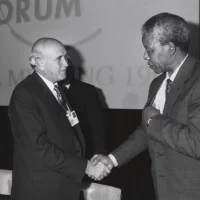The spread of AIDS in Africa in the 1980s and 90s presented unique challenges for U.S. diplomats suddenly faced with a public health epidemic. Not only did local hospitals and medical resources become overrun, diplomatic communities and Americans living abroad were threatened by the emergence of HIV/AIDS. While countries such as Uganda implemented crucial AIDS… Read More "A Never-ending Tragedy — The Onset of the AIDS Crisis in Africa"
Losing “The Congolese Bet” — The Belgian Congo’s Violent Road to Independence
Remembered as one of the most tragic victims of European imperialism, the Belgian Congo suffered decades of exploitation, violence, racism and repression. By restricting access to higher education and monopolizing political and military leadership positions, the Belgians maintained an iron hold over their resource-rich colony. Then, after a wave of African independence movements and without… Read More "Losing “The Congolese Bet” — The Belgian Congo’s Violent Road to Independence"
Jean Bédel Bokassa: The Man who Would be Emperor
Jean Bédel Bokassa ruled as President-for-life and later as Emperor of the Central African Republic from 1966 to 1979. In his youth he served in the French Colonial Army earning the rank of captain fighting in what would become Vietnam. Bokassa’s erratic and sometimes brutal regime began after he seized power in a military coup,… Read More "Jean Bédel Bokassa: The Man who Would be Emperor"
Known as the ‘Giant of Africa,’ Nigeria stretches across the continent like a patchwork quilt, sewn together from dozens of historically independent religious, ethnic and linguistic subgroups, all vying for political representation and control. After achieving independence in 1960, the infant nation struggled to maintain a fragile peace as members of the Muslim Hausa-Fulani ethnic… Read More "The Famine in Biafra — USAID’s Response to the Nigerian Civil War"
May 9th, 1994 marked one of the most significant – and previously unimaginable – milestones in modern African history as Nelson Mandela was inaugurated as President of South Africa. A key figure in the African National Congress (ANC) since the early 1950’s, Mandela was repeatedly arrested for seditious activities. Although initially committed to non-violent protest,… Read More "Nelson Mandela’s Road to the Presidency"
Top Ten Things You Learn From a Hostage Situation
Sometimes it just ain’t easy working for the State Department. If you go through the lengthy history of the Foreign Service in the second half of the 20th Century, there are a surprising number of diplomats who have been held hostage. And while the situations and political context are very different, certain things do stand out.…
Death of an FSO, As Remembered by His Widow
Dennis Keogh had been Political Counselor in South Africa from 1980-83 and made 25 trips to Namibia. In the spring of 1984, he agreed to serve for a month as head of the new U.S. Liaison Office (USLO) in Windhoek. In that troubled region, which South Africa had administered since World War I without a… Read More "Death of an FSO, As Remembered by His Widow"
The Rwandan Genocide — The View from Ground Zero
Two decades of ethnic tension and a civil war in 1990 laid the groundwork for one of the most savage episodes of wanton slaughter witnessed in the past half century. The day after the airplane carrying Rwandan President Juvénal Habyarimana and the president of Burundi was shot down, the Rwandan military responded to the deaths of… Read More "The Rwandan Genocide — The View from Ground Zero"
The State Department is not exactly known for its jocularity but once in a while, it can have its fair share of pranks. When April Fool’s Day rolls around, local officials may pull pranks on Foreign Service Officers, who in turn have occasionally played jokes on their fellow officers and superiors (which does not always… Read More "April Fool’s Day in the Foreign Service"
Evacuating Somalia
Codename: Operation Eastern Exit. In January 1991, violence due to the Somali Civil War had escalated so much that Ambassador James K. Bishop requested military assistance in an evacuation of the U.S. Embassy in Mogadishu. This evacuation had more than its share of unexpected challenges, in no small part because the Pentagon was totally focused… Read More "Evacuating Somalia"



